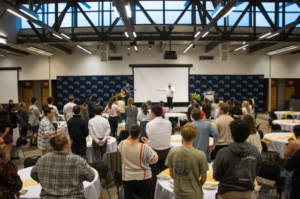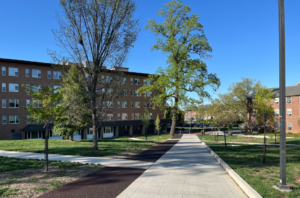Students Face a Lack of Job Opportunities Amidst a Crushing Pandemic

Image Courtesy of the Center for Academic and Career Success website
By Emily Curran
On an average Friday night before the pandemic, senior music and politics double-major Will Lucardi could be found dining at one of his favorite restaurants, enjoying the opera at The Kennedy Center, or hanging out with friends in a crowded apartment.
“We would have large groups of people gathered together, and no one cared if you exhaled in their direction,” Lucardi said. “I used to meet new people all the time. Now I’m not meeting people at all.”
As the pandemic drags on, Lucardi spends his free time doing homework in his room or hanging out with one or two friends within his bubble.
“The best way to describe my social life is stalled,” Lucardi said.
The pandemic has caused college students to miss valuable experiences that make college… college. It has also eradicated a crucial component to students’ learning opportunities: college jobs and internships. While in years past, students fought to see whose internship was the best or who could nab the paid ones, it seems like this year, there are none. Furthermore, students who have been able to find a job or internship have seen their work environment dramatically shifted from years prior.
According to studies performed by the National Association of Colleges and Employers, it seems like internships are hard to come by. While only 2% of employers have revoked full-time positions for recent college graduates, 16% have revoked internships, and another 75% have changed how their internships function. Of this 75%, 40% of employers have shifted their internship to a virtual platform, 40% have shortened the length of their programs, and 20% have reduced the number of students they choose to bring on.
This might be beneficial for companies, who now may spend less on their internship programs and ensure the safety of their employees, but it is catastrophic for students. A survey completed by Forbes asked students if the lack of internships available had swayed their confidence in their career field, and 75% of students said that it had.
Junior Spanish for international service major Lizetthe Moreno applied for a summer internship with the Supreme Court last spring, only for it to be canceled just weeks later.
“You have to be really flexible. It’s hard to get the exact position, or exact job, or exact internship that you want,” Moreno said. “This hurts students because we’re expected to have experience, but we can’t have internships because of the pandemic.” Rather than working for the Supreme Court, Moreno accepted a position at the Kane Fitness Center on campus. She enjoyed her job because of its flexibility and positive work environment, but was unable to get any experience directly relating to her field.
Lucardi has seen his work load significantly reduced. As one of the few organists in the D.C. metro area, he was busy nearly every weekend prior to the pandemic. Lucardi typically plays Sunday mass, his main job, but is also hired for private events such as weddings, funerals, and parties. Because churches now have capacity restrictions and private events have been all but canceled, this work has been much harder to come by.
“I’m doing about half the volume of other performance engagements,” Lucardi said. “When there’s no pandemic, there’s a lot of available work.” Lucardi noted that he is only making 75% of what he has in years prior, and even finding work to play Sunday mass proved to be a challenge.
“A lot of parishes have either cut their music programs entirely or have dramatically reduced their music programs,” Lucardi said. “It’s 1000% because of the pandemic why, in my little niche of a profession, it became very difficult to find work.”
For students who have been lucky enough to get a job or internship this past semester, they have seen their work environment changed from initial expectations.
Junior physics major Anthony Grieco is performing research for NASA studying geomagnetic patterns in the ionosphere. Rather than working in a lab with other researchers, Grieco is working from home on his laptop.
“Ideally, what would have happened is that I would be working at Goddard, but naturally, because of the pandemic, that hasn’t happened,” Grieco said. “In terms of functionality, my computer’s a little slower than what would be available to me at NASA.” Rather than only spending his assigned 12 hours per week working, Grieco said that he typically works 15 to 18 hours because of the extra time it takes for his software to process. Despite these challenges, Grieco stated that he is thoroughly enjoying the internship and it will be extremely valuable for future job opportunities.
Senior psychology major Jake Rosario is working in-person on-campus as a resident assistant, a job he has held since sophomore year. In addition to the extra responsibilities RAs have such as enforcing public safety protocols, Rosario said that the additional stress has threatened job security, making work more difficult.
“Everybody’s kind of in fight or flight mode trying to keep their own jobs,” Rosario said. “It’s kind of undermining the integrity of this community, this family, that I’ve always known the Resident Assistance family to be.”
Even though the job market has changed substantially for college students, finding a job that is beneficial to their education and careers is not impossible. The director of the Center for Academic and Career Success at Catholic University, Tony Chiappetta, has seen that while the nature of internships is shifting, many are still available.
“They found a way to keep it open through micro-internships,” Chiappetta said. “It’s nice because students can do more than one in a certain period and it does expose them to more opportunities in their field.” Micro-internships are shorter, smaller internships that may focus on a single project or subject within a company. These allow students to gain valuable work experience in a specialized area, and permits students to work several different internships within a single semester.
Although the job market seems desolate, not all hope is lost. Chiappetta said that of the 69% of Class of 2020 graduates that his office could gather outcomes data on, 92% are currently employed, pursuing higher education, pursuing both, or are participating in an internship, long-term service, or are a member of a religious community. For the Class of 2021, and other rising classes, now is the time to begin looking for jobs.
“Employers are hiring consistently, but they’re cautious,” Chiappetta said. “Graduates seeking employment need to be paying attention to what’s going on in their industries and when employers are hosting recruitment functions. Everything is online, and so… they have to be tuned in online.”
Catholic University uses an online platform called “Handshake” that enables students to connect with employers and alumni to find potential job and internship opportunities. Many other companies use LinkedIn or their websites to post job opportunities or career fairs.
In addition to online resources, Lucardi recommends cold-calling employers.
“It’s a very unique brand of conversation when you get somebody on the phone,” Lucardi said. “Whether or not an employer is willing to admit it, I think they would be more willing to hire someone because they can establish an emotional connection.”
In this strange, pandemic-induced job market, finding a job or internship can seem daunting. Rather than employers setting up post in the Pryz, or students receiving dozens of emails each week about the latest internship opportunities, there is radio silence. However, there are still jobs if students can find them, it just takes a lot more determination this year.
“I think not having in-person meetings… creates an accountability gap,” Moreno said. “We know the expectations. You just have to improvise, adapt, and overcome to meet those expectations on your own.”







